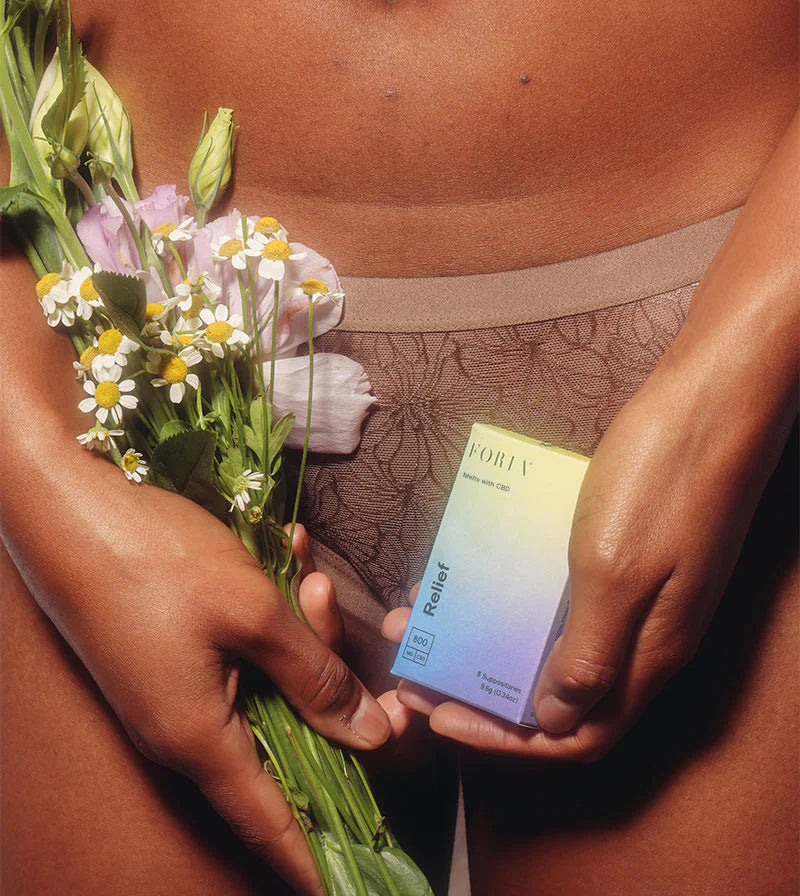“Why does my vagina hurt after sex?” is a question you might find yourself searching for answers to, especially as you age. The same sex that used to leave you feeling pleasantly sore the next day can start to take longer to recover from — and may even make you not want to be sexually intimate as often.
If this is happening to you, don’t ignore it or “just deal with it” — sex should be fun and feel good. In this post, we’ll answer some of the most common questions about vaginal pain and offer some tips and tricks for helping counteract it.
Sit back, relax, and let’s deconstruct what the heck might be happening downstairs.
What Causes Your Vagina To Hurt After Sex?
Ok, let’s get right to business. You want to know the answer to “why does my vagina hurt after sex?” and we’ve got your answers.
There are actually a few reasons you can end up with an unwanted reminder of a night of intimacy. It’s likely you’re dealing with a combination of multiple issues — because life can never be simple, right?
Skipping the Lube
It can be a point of pride that some people with vaginas get super wet with very little help. When you’re young and carefree, you tend to take those natural, hormonal gifts for granted.
As we age (and yes, this happens to everyone), the hormones we need to keep making vaginal lubrication are pumped into the body in smaller and smaller amounts. One of the most crucial is estrogen, the driving force between vaginal wetness and sexual desire (libido).
Luckily, you don’t have to deal with penetration feeling like you’re being sandpapered from the inside because, thankfully, lube exists! From sex oils to water-based lubes, with a bit of guidance, you can find the perfect lube for the exact type of sex you’re having.
For example, did you know that you shouldn’t use silicone-based lubes on your silicone sex toys? Did you know water-based lubes aren’t great for shower or tub sex because they wash away?
Choosing the right lube is crucial, but regardless of what you decide, don’t have sex without it (unless the sandpaper thing is your specific kink, that is).
Certain Infections
The vagina may be delightfully durable, but don’t take its strength for granted. The inside of the vagina is made out of muscle and covered with a mucus membrane (just like the inside of the mouth).
While that setup is excellent for pumping out lubrication and being warm and flexible, it also makes the vagina susceptible to infection. Vaginal infections are one of the top reasons people with that part visit their doctor every year.
While some of these infections are transmitted through sex (like trichomoniasis, chlamydia, and gonorrhea), others can occur as the result of even a slight change in the vagina’s pH. We call vaginal infections “vaginitis,” and the overall irritation they cause can trigger pain after intercourse.
If you’re noticing pain in addition to vaginal discharge with an unusual smell or texture or itching, it’s time for a trip to your doctor.
Sexual Anxiety
Does the thought of getting naked with someone, even if that someone is your long-term partner, make you break into a cold sweat? Sexual anxiety (also called performance anxiety) can happen to people with female bodies just as often as it happens to people with a penis.
There are plenty of reasons why this happens, from body image issues to relationship roadblocks to fears that you’re not doing a good job, but the result negatively impacts your sex drive. So what can you do about it?
Tackling sexual anxiety means looking at why you’re feeling that way. It starts with identifying your triggers and finding a way to cope with them. Develop a greater sense of mindfulness, seek therapy if necessary, and get comfortable with the idea that no one can ever be perfect — and you deserve to feel safe and comfortable, in bed and out of it.
And there’s something super sexy about letting go of expectations and even laughing with your partner in the bedroom. That level of comfort and vulnerability is also great for building a stronger bond and sense of intimacy.
Rough Sex
Rough sex is definitely a common kink, whether you’re into getting spanked, having your hair pulled, being tied up, or any other form of consensual BDSM play. If you’re sitting around wondering, “why does my vagina hurt?” after a particularly kinky roll in the hay, it isn’t too tough to figure out what may be happening.
But what if you don’t feel like you’ve gone too hard and you’re still experiencing vaginal pain after intercourse? It can all come back to those often subtle hormonal changes we discussed earlier. What felt good in your 20s may not feel as good in your 50s, through no fault of your own.
Those lower estrogen levels have another side effect other than a lack of natural vaginal lubrication — your vaginal tissue can also get thinner. This effect is known as vaginal atrophy, which can make sex uncomfortable both during and afterward.
Vaginal atrophy can also mean that the same sex you had when you were younger takes your body longer to recover from now that you’re getting older.
While age is only a number, you can’t overlook its impact on your body. As long as your sex drive is still kicking, you’re never too old to enjoy sex. Again — lube, lube, lube. Never mess around without it.
Some Medical Conditions
We may focus on specific body parts, but it’s also important to remember that all of them exist as smaller parts of a whole. What happens to one system almost always impacts another, which is why some medical conditions can also affect how your vagina responds during and after sex.
The perfect example of this concept in action is the process of menopause, which starts for most people in their early 40s and lasts until their 60s. As the body changes, hormones rise and fall, weight distribution and hair thickness change, and even the mood can take a hit.
Amazing that such a tiny little hormone can have such a big impact, right? However, other medical conditions (including some that you may not expect!) can also be a literal pain.
Here’s just a handful of them:
- Vulvodynia (persistent vaginal pain for no reason)
- Physical trauma (issues during childbirth, like tearing, or even just cutting yourself shaving)
- Emotional trauma (sexual abuse, post-traumatic stress disorder, etc.) that can lead to physical sensations of pain known as vaginismus
- Pelvic floor weakness dysfunction (with or without urinary leaking)
- Bartholin’s cyst inflammation (glands located inside the vagina that help it lubricate itself)
- Medication side effects (especially certain forms of birth control and antidepressants — but remember never to stop taking meds without talking to your doctor!)
- Specific gynecological issues like endometriosis, uterine fibroids, or pelvic inflammatory disorder (PID)
When Should You See a Doctor?
We’re big believers that any new or unusual symptoms should be checked out by a doctor when possible! If you suddenly notice vaginal pain after intercourse, especially if it persists or worsens, a trip to your doctor may be in order.
If that pain is severe, you may even want to visit the ER just in case. Don’t mess around with your vaginal health — you only get one, after all!
How Can You Prevent Discomfort After Sex?
After answering “why does my vagina hurt after sex?” and potentially visiting a doctor, the next natural question is how to prevent it.
We’ve talked plenty about lube, and we’ve hopefully driven home how crucial it is to use it to help keep everything as slippery and comfortable as possible. But what else can you do?
One of our favorite additional tools at your disposal is the Relief Melt. These small, super easy-to-insert suppositories help reduce discomfort inside the vagina and pelvic floor during and after penetrative intercourse.
Insert them before sex to avoid discomfort, or use them afterward if you notice the vaginal pain creeping up. Pro tip: if you still have periods, you can even use the melts to help with menstrual cramps.
But don’t just treat the physical without also engaging your brain. If you’ve been diving right into banging it out without priming the pump, so to speak, we beg you to invest more time into foreplay. Even just a few minutes of foreplay gets your head in the game, increases your physical arousal, and makes your body more resilient.
The Bottom Line
Why does my vagina hurt after sex? It could be a lack of lubrication, an underlying medical issue, or several other issues. However, don’t put up with painful sex.
Get back to getting it on with comfort and confidence by taking steps to deal with the pain. For more tips and tricks on keeping your sex life fresh, pleasurable, and comfortable, check out our blog!
Sources:
Experiencing Vaginal Dryness? Here's What You Need to Know. | ACOG
Overview of Vaginal Infections | Merck
Want more? Sign up for our newsletter
By entering your email, you are agreeing to our terms and conditions and understand our privacy policy.








